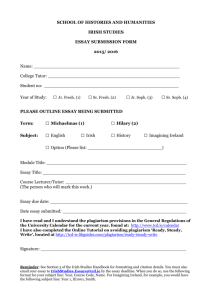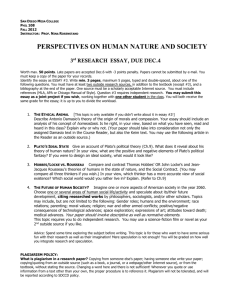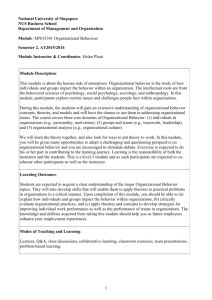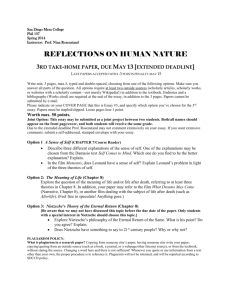Comm 105: Writing for Humanities
advertisement
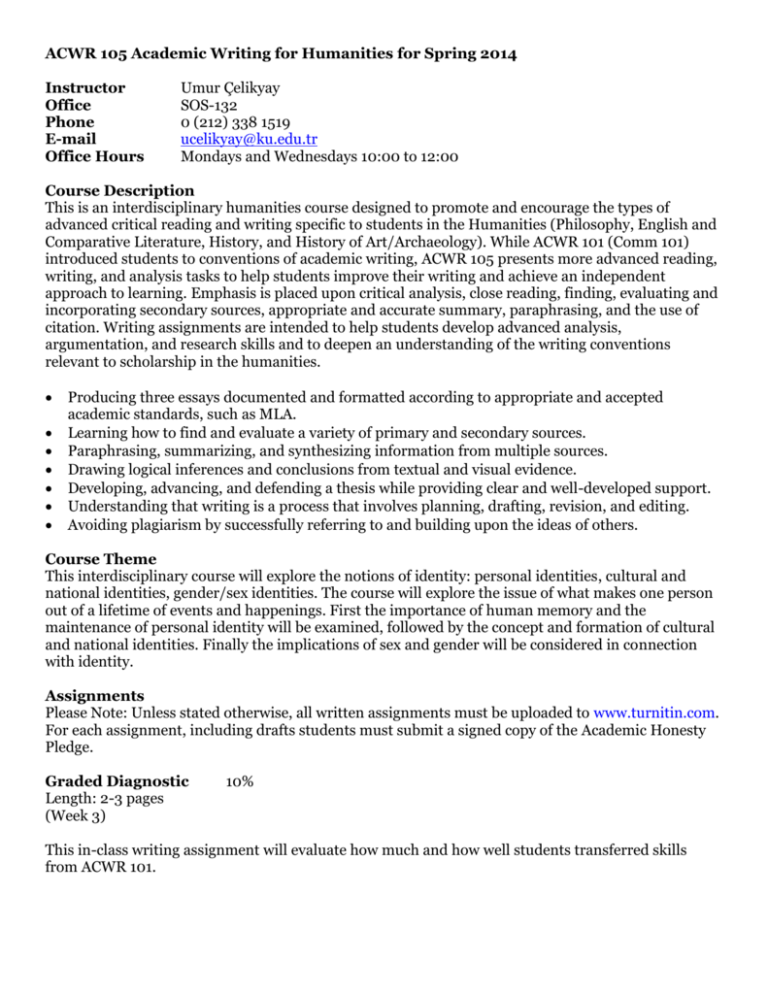
ACWR 105 Academic Writing for Humanities for Spring 2014 Instructor Office Phone E-mail Office Hours Umur Çelikyay SOS-132 0 (212) 338 1519 ucelikyay@ku.edu.tr Mondays and Wednesdays 10:00 to 12:00 Course Description This is an interdisciplinary humanities course designed to promote and encourage the types of advanced critical reading and writing specific to students in the Humanities (Philosophy, English and Comparative Literature, History, and History of Art/Archaeology). While ACWR 101 (Comm 101) introduced students to conventions of academic writing, ACWR 105 presents more advanced reading, writing, and analysis tasks to help students improve their writing and achieve an independent approach to learning. Emphasis is placed upon critical analysis, close reading, finding, evaluating and incorporating secondary sources, appropriate and accurate summary, paraphrasing, and the use of citation. Writing assignments are intended to help students develop advanced analysis, argumentation, and research skills and to deepen an understanding of the writing conventions relevant to scholarship in the humanities. Producing three essays documented and formatted according to appropriate and accepted academic standards, such as MLA. Learning how to find and evaluate a variety of primary and secondary sources. Paraphrasing, summarizing, and synthesizing information from multiple sources. Drawing logical inferences and conclusions from textual and visual evidence. Developing, advancing, and defending a thesis while providing clear and well-developed support. Understanding that writing is a process that involves planning, drafting, revision, and editing. Avoiding plagiarism by successfully referring to and building upon the ideas of others. Course Theme This interdisciplinary course will explore the notions of identity: personal identities, cultural and national identities, gender/sex identities. The course will explore the issue of what makes one person out of a lifetime of events and happenings. First the importance of human memory and the maintenance of personal identity will be examined, followed by the concept and formation of cultural and national identities. Finally the implications of sex and gender will be considered in connection with identity. Assignments Please Note: Unless stated otherwise, all written assignments must be uploaded to www.turnitin.com. For each assignment, including drafts students must submit a signed copy of the Academic Honesty Pledge. Graded Diagnostic Length: 2-3 pages (Week 3) 10% This in-class writing assignment will evaluate how much and how well students transferred skills from ACWR 101. Essay 1: Close Reading 1st draft (Week 4) 10% Final (Week 6) 15% Length: 2-3 pages This processed paper will ask students to present and support an argument based on a close reading of an assigned text (students will choose their text from a variety of different kinds of texts drawing from the different disciplines). In other words, students must develop and defend an interpretation of a text. This essay will have graded first and final drafts. Essay 2: Critical Analysis 1st draft (Week 8) 10% Final (Week 10) 15% Length: 3-5 pages This processed paper asks students to engage with the same text as they discussed in Essay 1; however, in this assignment, students must go beyond their own understanding of the text by applying an existing critical framework to the text. This essay builds students skills for approaching and interpreting a single text in multiple ways and works as a scaffolding assignment, leading to Essay 3. Instructors will provide the text that represents the critical framework. Students must use this critical text, their primary text (from Essay 1), and one additional source. This essay will have graded first and second drafts. Essay 3: Synthesis of Skills 20% Length: 5-6 pages Discovery Draft (Week 13) Final Draft (Week 15) This essay will ask students to incorporate the close reading, critical analysis and research skills developed in Essays 1 and 2 into a longer paper that incorporates more research. This assignment is designed to foster independent work, including individual interest driven research and self-guided revision. To encourage independence, individual topics for this assignment will vary, (though all essays must include four sources: a primary text, a guiding critical text, and two additional sources), and though this paper is processed, only the final draft will be graded. Participation, Homework and Quizzes 20% Required Course Materials 1. Course packet for ACWR 105 will be available in Copyland at the student center. 2. Required handbook: Hacker, Diana. Rules for Writers. 7th ed. Boston: Bedford/St. Martin’s Press. Available in the bookstore. 3. English/English dictionary. 4. An A4 notebook used only for ACWR 105. 5. A folder in which students will keep all additional material and copies of all essay drafts. 6. Writing implements: pen or pencil, eraser, paper. Plagiarism Policy (Please also see additional Document) Plagiarism is presenting someone else's words or ideas as your own, without proper reference. You are graded on your own individual work, not another's masquerading as your own. Any student found plagiarizing on or colluding in writing assignments will be referred to the university's disciplinary council. This may result in failing the assignment, failing the course, and/or being suspended from the university. You commit plagiarism when: 1. You copy someone else's writing and do not put it in quotation marks and identify the source; 2. You take someone else's writing, change some of the words, and do not identify the source; 3. You take someone else's ideas or sequence of ideas, put them into your own words, and do not identify the source; 4. Someone else writes your assignments or changes your writing and thus creates a false impression of your abilities. You engage in collusion by receiving unauthorized help with your writing by paying or otherwise inducing another person to do the writing for you. Attendance Policy Class attendance is required, and any absences will negatively impact your participation grade. If you accumulate more than 3 unexcused absences, it will result in a reduction of your final grade for the course: 4 unexcused absences = 5% penalty, 5=10%, 6=15%, 7=20%. If you accumulate more than 7 unexcused absences, you will automatically fail the course. Excused absence forms must be submitted within one week of the absence date, or they will not be honored. Consult with your instructor if you believe there are extenuating circumstances that have made it impossible for you to regularly attend class. Please come to class on time; each three times you arrive to class more than five minutes late will count as one absence. Note: you are still responsible for any and all class work and homework covered during your absence, no matter what the reason is. Any deadlines will still be valid. Policy on Late Work No work submitted after the deadline for the next assignment has passed will be accepted. For example, an outline of the research paper submitted on or after the deadline for the submission of the first draft will not be accepted. No student work will be accepted unless all previous stages of the assignment have been completed. For example, a student who has not submitted a research paper proposal on or before the deadline for the outline may not submit the outline. An instructor may accept work submitted late, but before the next deadline, in order to validate the grading of the next stage, but the instructor is not obliged to award a grade, read, or provide feedback on work that is submitted late. There is a five point penalty for each day an assignment is late. Grading Scale A 100–90% B+ 86–83% A- 89–87% B 82–80% B- 79–77% C+ 76–73% C 72–70% C- 69–67% D+ 66–63 D 62–60 F 59–0 Grade Disputes If you dispute a grade for a formal assignment, you must contact your instructor within two weeks of the date the grade has been issued to discuss the situation. Note: The Academic Writing Program has a firm policy regarding petitions for re-grading assignments, and will not accept petitions filed after the two week deadline. For more information regarding this policy, contact your instructor. Course Guidelines and Expectations Come to class prepared, with all your materials and tools, having read all assigned materials. Behave respectfully toward your fellow students, and the instructor. Submit neat and professional work. Keep up with readings, work and all expectations. Be in charge of your own learning. Be awake and alert. Participation is active engagement with class work, discussions and all other aspects of learning. Merely coming in the classroom and being present does not constitute participation. Student-Instructor Conferences Students will be expected to attend occasional meetings (individually or in groups) with the instructor. The purpose of these meetings is to discuss and review draft of papers and assignments, or deal with issues relevant to the course matter. These meetings will count towards attendance. Use of the English Language Students are expected to use English and English only for conducting all class work and all academic interaction with the instructor. Likewise, all instructor-student conferences and tutorials will be conducted in English. E-mail If you have an issue or question that cannot be dealt with in class time, contact the instructor via ucelikyay@ku.edu.tr. E-mail sent to any other address will not be answered. Remember to fill in the “subject” field. Please be as specific as you can be and identify yourself by full name and class section. Students are expected to use e-mail sensibly. Please do not send junk mail, images, animations, executable files, or other attachment to your instructor’s account. The instructor checks mail a few times every weekday during business hours, so in most cases you can expect to get a reply within a reasonable time. If you send an e-mail outside business hours, the reply will probably come sometime in the next business day. All messages must be written in clear grammatically correct English, in line with guidelines received in your ALIS training. Please remember that some issues are not suitable for e-mail and better handled in face-to-face meetings. Phone Calls You may call the instructor on the office phone to setup a meeting or for other issues. Make sure that you identify yourself by name and section. Again, please remember that face-to-face dialogue may be more appropriate for certain situations. The instructor will not accept calls or text messages on his private mobile telephone numbers. Course schedule (Subject to change) Dates Objectives, Activities and Topics Readings and Homework Assignments 1. Feb 3 Feb 5 Introduction to course theme, and expectation Study Plans/Organization Topic: What is personal identity? Note Taking (Cornell) Topic: Memory and Identity Reading 2. Feb 10 Feb 12 3. Feb 17 Feb 19 4. Feb 24 Feb 26 5. Mar 10 Mar 12 6. Mar 17 Mar 19 Wayne Steward, “Personal Identity” Reading Student lead discussion using Oliver Sacks, “A Matter of notes. Identity” Review of Note taking (Cornell) Review of Summarization Review of MLA requirements Introduction to Essay 1 Creating an essay outline Topic: The existence of ‘self’ Reading Discussion of Hume Skills for reading difficult texts Close reading exercise Student lead discussion Review of Essay 1 requirements. Topic: Personal Identity Reading Topic: What is Identity? Reading Distinguishing arguments from examples Reading strategies Paraphrasing and Summary skills James Fearon, “What Is Identity (As We Now Use The Word)?” (pages TBA) Topic: What is Identity? Graded Diagnostic Selected pages from “A Treatise of Human Nature” (Of Personal Identity), by David Hume Review of summarization and “Where Am I?” by Daniel appropriate paraphrasing Dennet Using quotations as support Evaluating Sources Conferences October 28: No Class Notes due Reading First Draft Essay 1 (Turnitin) Conference signups. Mandatory Individual conferences Final Draft Essay 1 James Fearon, “What Is Library–Finding sources Identity (As We Now Use The 7. Mar 24 Mar 26 8. Mar 31 Apr 2 9. Apr 7-11 10. Apr 14 Apr 16 Library Research Session Word)?” (pages TBA) Topic: Ottoman Identity Reading Essay 2 introduced Using a Bibliography Organizing Research Topic: Ottoman Identity F. Aslı Ergül, “The Ottoman Identity: Turkish, Muslim or Rum?” (Pages TBA) Reading First Draft Essay 2 Reading strategies reviewed Literature reviews Discussion/Informal Debate Selective summary/analysis Spring Break F. Aslı Ergül, “The Ottoman In class writing Identity: Turkish, Muslim or Rum?” (Pages TBA) Students must sign up for individual conferences Topic: Sex and Gender Identity Reading Student Conferences Selections from “Femininity/Masculinity,” by How we identify ourselves as Jan E. Stets and Peter J. men and women Burke Popular culture and gender identity 11. Apr 21 Topic: Sex and Gender Masculinity How boys learn to identify themselves as men. 12. Apr 28 Apr 30 Essay 3 requirements Topic: Sex and Gender – Femininity (semiotics and female space) Selections from “Codes of Identity Study Guide” - given in class Film (in class): “Codes of Gender” Reading: Selections from Final Draft Essay 2 “Tough Guise Study Guide” – given in class Student Conferences In Class Film: Tough Guise Reading “Advertising and Consumer Culture” by Jean Bruce Image analysis/Female space /Discussion 13. May 5 May 7 Topic: Identity issues in Academic Disciplines (Archeology) Students must bring a women’s magazine and be ready to discuss the form and content Short in class writing Reading Selections from “Is Androcentric Archaeology Review of MLA requirements Really About Men?” by Reading notes Discovery Draft for Essay Sign up for conferences Lisbeth Skogstrand 14. May 12 May 14 Topic: Identity issues in Academic Disciplines (Archeology) Conferences Reading Reading Notes Selections from “Is Androcentric Archaeology Really About Men?” by Lisbeth Skogstrand Final Draft Essay 3 In-class course reflection Koç University Statement on Academic Honesty with Emphasis on Plagiarism Koç University expects all its students to perform course-related activities in accordance with the rules set forth in the Student Code of Conduct (http://vpaa.ku.edu.tr/academic/student-code-ofconduct). Actions considered as academic dishonesty at Koç University include but are not limited to cheating, plagiarism, collusion, and impersonating. This statement’s goal is to draw attention to cheating and plagiarism related actions deemed unacceptable within the context of Student Code of Conduct: All individual assignments must be completed by the student himself/herself, and all team assignments must be completed by the members of the team, without the aid of other individuals. If a team member does not contribute to the written documents or participate in the activities of the team, his/her name should not appear on the work submitted for evaluation. Plagiarism is defined as “borrowing or using someone else’s written statements or ideas without giving written acknowledgement to the author.” Students are encouraged to conduct research beyond the course material, but they must not use any documents prepared by current or previous students, or notes prepared by instructors at Koç University or other universities without properly citing the source. Furthermore, students are expected to adhere to the Classroom Code of Conduct (http://vpaa.ku.edu.tr/academic/classroom-code-of-conduct) and to refrain from all forms of unacceptable behavior during lectures. Failure to adhere to expected behavior may result in disciplinary action. There are two kinds of plagiarism: Intentional and accidental. Intentional plagiarism (Example: Using a classmate’s homework as one’s own because the student does not want to spend time working on that homework) is considered intellectual theft, and there is no need to emphasize the wrongfulness of this act. Accidental plagiarism, on the other hand, may be considered as a ‘more acceptable’ form of plagiarism by some students, which is certainly not how it is perceived by the University administration and faculty. The student is responsible from properly citing a source if he/she is making use of another person’s work. For an example on accidental plagiarism, please refer to the document titled “An Example on Accidental Plagiarism”. If you are unsure whether the action you will take would be a violation of Koç University’s Student Code of Conduct, please consult with your instructor before taking that action. An Example on Accidental Plagiarism This example is taken from a document prepared by the City University of New York. The following text is taken from Elaine Tyler May’s “Myths and Realities of the American Family” “Because women’s wages often continue to reflect the fiction that men earn the family wage, single mothers rarely earn enough to support themselves and their children adequately. And because work is still organized around the assumption that mothers stay home with children, even though few mothers can afford to do so, child-care facilities in the United States remain woefully inadequate.” Below, there is an excerpt from a student’s homework, who made use of May’s original text: “As Elaine Tyler May points out, “women’s wages often continue to reflect the fiction that men earn the family wage” (588). Thus many single mothers cannot support themselves and their children adequately. Furthermore, since work is based on the assumption that mothers stay home with children, facilities for day care in this country are still “woefully inadequate.” (May 589).” You may think that there is no plagiarism here since the student is citing the original author. However, this is an instance of accidental plagiarism. Although the student cites May and uses quotation marks occasionally, the rest of the sentences, more specifically the following section: “Thus many single mothers cannot support themselves and their children adequately. Furthermore, since work is based on the assumption that mothers stay home with children, facilities for day care in this country are still “woefully inadequate.” (May 589)” almost exactly duplicates May’s original language. So, in order to avoid plagiarism, the student either had to use quotation marks for the rest of the sentences as well, or he/she had to paraphrase May’s ideas by using not only his/her own words, but his/her own original ideas as well. You should keep in mind that accidental plagiarism often occurs when the student does not really understand the original text but still tries to make use of it. Understanding the original text and understanding why you agree or disagree with the ideas proposed in that text is crucial both for avoiding plagiarism and for your intellectual development. Source: Avoiding and Detecting Plagiarism: A Guide for Graduate Students and Faculty. The Graduate Center. City University of New York, 2012. Web. <http://www.gc.cuny.edu/CUNY_GC/media/CUNY-GraduateCenter/PDF/Publications/AvoidingPlagiarism.pdf>.


